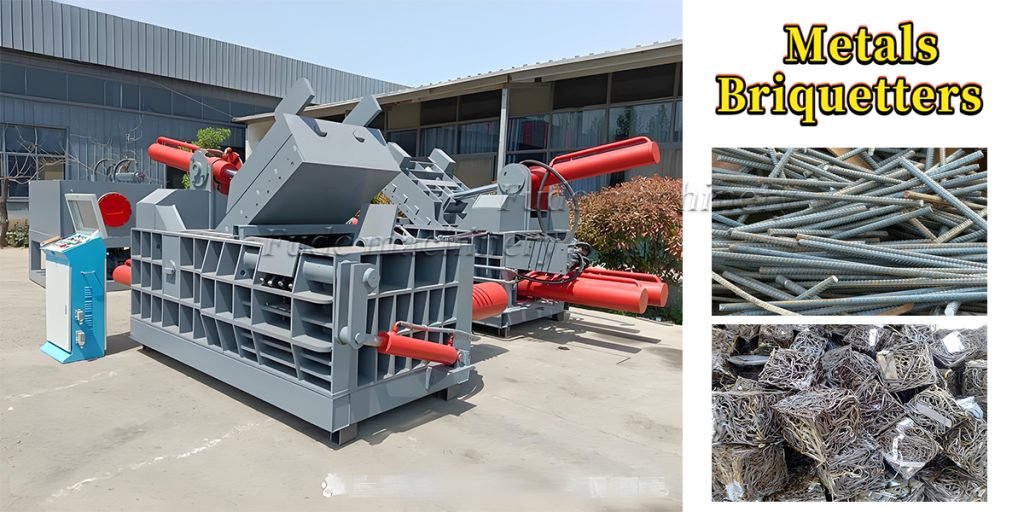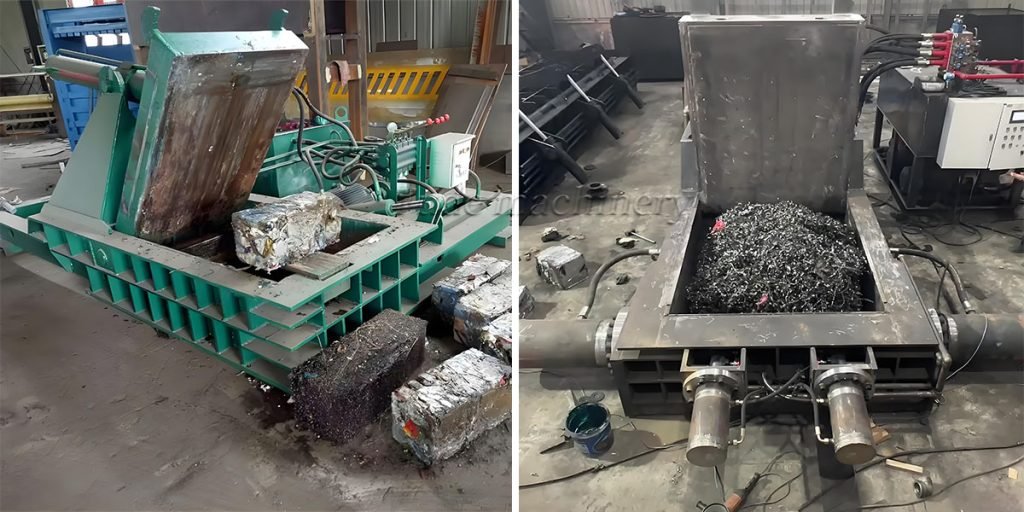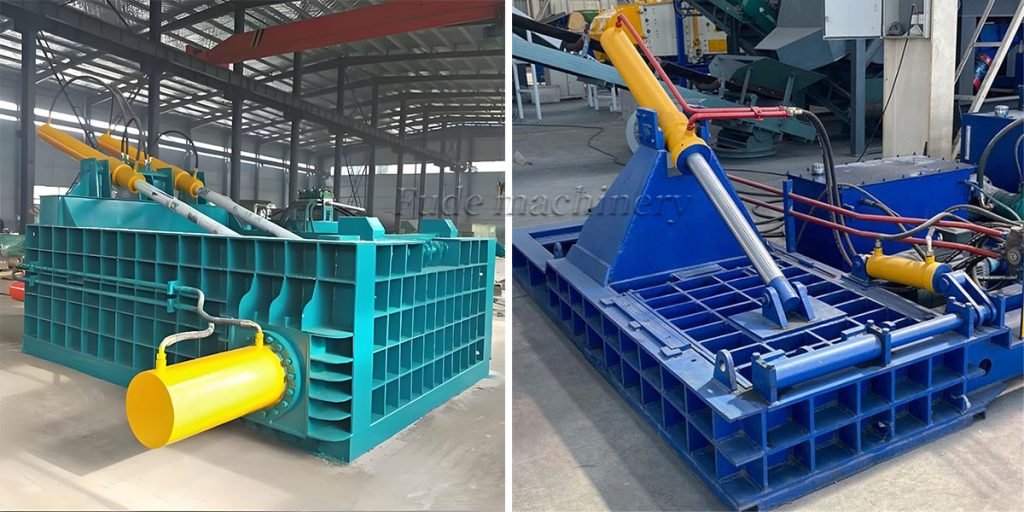A metal briquetting machine uses immense hydraulic pressure to press loose scrap metal into dense, solid blocks. The process does not use heat or any additives. The machine takes materials like metal chips, turnings, and filings. It forces them together in a compression chamber. This transforms low-value, bulky waste into a compact, valuable resource. This makes your scrap much easier to store, transport, and melt.
What Is the Core Mechanism Behind a Metal Briquetting Machine?
The core mechanism is high-pressure hydraulic compaction. Think of our machine as a giant press that squeezes material from multiple directions. Inside the machine, there is a strong steel chamber. Your loose metal scrap is fed into this chamber.
Then, powerful hydraulic cylinders push against the scrap with tremendous force. This force can be hundreds of tons. This pressure forces the individual metal pieces to crush together. It removes the air pockets between them. This process binds the metal without needing to melt it.
This technique is called “cold pressing.” This is a key feature. Because we do not use heat, the original properties of the metal are not changed. This is very important. It means the briquettes you create have the same quality as the original scrap. There is no burning loss.
No chemical changes happen. It is a purely physical transformation. The result is a solid block of metal. It has a high density. It is also very stable. The machine is designed to apply this pressure evenly. This ensures that every block is uniform in size and density.
The Step-by-Step Process: From Loose Scrap to Solid Block
The process of making a high-density block is simple and automated. It follows a clear sequence. This makes it reliable and efficient for you.
- Feeding the Scrap: First, your loose metal scrap is loaded into the machine’s hopper. This can be done manually. Or it can be done automatically with a conveyor or a feeding machine. We can provide these as part of a complete production line. The hopper holds the scrap. It feeds it into the compression chamber when the machine is ready.
- The Compression Cycle: Once the chamber is filled, the main hydraulic cylinders activate. A powerful ram pushes into the chamber. It squeezes the scrap metal. The pressure builds up quickly. It removes all the empty space between the metal pieces. The metal particles are forced to interlock and bond together. This forms the solid block.
- Dewatering and Oil Recovery: If your scrap metal is wet or contains cutting fluids, this is when they are removed. The immense pressure squeezes out any liquids. These liquids are collected through a drainage system at the bottom of the machine. You can then filter and reuse this valuable cutting oil. This saves you a lot of money.
- Ejecting the Briquette: After the block reaches the target density, the pressure is released. A separate hydraulic cylinder then pushes the finished briquette out of the chamber. The block slides onto a chute or conveyor belt. It is then ready for storage or transport. The entire cycle is very fast. It can take less than a minute. This allows you to process a large volume of scrap quickly.
Why Is High Density So Important For Your Business?
High density is the main reason why briquettes are so valuable for your business. Getting your scrap into a dense form provides many direct benefits. It impacts your costs, efficiency, and profits. Loose metal scrap is bulky. It is hard to handle. It takes up a lot of space. High-density blocks solve all these problems. They are compact and uniform. This makes them easy to stack and store.
The biggest advantages come from cost savings and increased value. Transporting dense briquettes costs much less than transporting loose scrap. You can fit more weight into a single truck. This reduces the number of trips you need to make. When it comes to melting, dense blocks are much better. They have a higher metal recovery rate in the furnace. This is because there is less surface area for oxidation or burning. You get more usable metal back from each melt. This saves energy. It also improves productivity. Foundries often pay a higher price for briquettes. They know they will get a better yield. This turns your waste into a premium product.
Practical tips for you:
• Analyze your current scrap volume. See how much space and transport cost you can save.
• Use a metal chip briquetting machine for very fine materials. It is designed for optimal density.
• Keep records of briquette weights. This helps with inventory and sales management.
• Always separate different types of metal before briquetting. This keeps material purity high.
What Key Technologies Make This Process So Effective?
The effectiveness of our metal briquetting machines comes from a combination of robust hydraulic engineering and smart automation. Our machines are built around a powerful hydraulic system. We design these systems for high pressure and reliability. They use high-quality pumps, valves, and cylinders. This ensures consistent performance day after day. The hydraulic system provides the immense force needed to compact even the toughest metal scraps. It is the heart of the machine.
The brain of the machine is the PLC (Programmable Logic Controller) system. This is an industrial computer that controls all the machine’s functions. The PLC allows for full automation. You can set the parameters for your specific material. This includes compression time, pressure levels, and block size. The machine will then run automatically. This reduces the need for constant monitoring by an operator. This smart control makes the process precise and repeatable. It ensures every briquette meets your quality standards. It also makes the machine safer to operate.
What Happens to the Fluids Pressed Out from the Scrap?
The fluids pressed out during compaction are captured and can be recycled. This is a huge benefit for businesses in the machining and manufacturing sectors. Metal chips and turnings are often soaked in expensive cutting oils and coolants. When our metal briquetting machine compresses this scrap, the pressure squeezes these fluids out. A collection system channels the fluid into a tank.
This recovered fluid can then be filtered and reused. This process can recover up to 95% of the cutting fluids from your scrap. This dramatically reduces your need to buy new fluids. This can result in significant cost savings. It also helps you meet environmental regulations. Disposing of oily scrap can be costly and difficult. Our machine solves this problem. It separates the metal from the fluid. You are left with two valuable resources: clean, dense metal briquettes and reusable cutting oil. This is a perfect example of turning waste into treasure.
2025 Latest Developments and Trends in Briquetting
The technology for metal briquetting machine continues to evolve in 2025. The latest trends focus on greater intelligence, connectivity, and efficiency. Machines are becoming smarter. They have sensors that can analyze the scrap material in real-time.
This allows the machine to automatically adjust the pressure and cycle time. This optimizes the process for different types of metal scrap. This means better briquette quality with less operator input.
Latest advancements at a glance:
• Integrated Sensors: Automatically adjust settings for different scrap types.
• Remote Diagnostics: Allows our technicians to troubleshoot issues remotely, reducing downtime.
• Energy Recovery Systems: New hydraulic designs capture and reuse energy, lowering power consumption.
• Quieter Operation: Improved designs reduce noise levels, creating a better work environment.
Market demand continues to grow for these solutions. The global push for a circular economy and sustainable manufacturing puts a high value on efficient recycling. Companies are realizing that investing in technology to process waste on-site is smart. It gives them more control over their resources. It also protects them from volatile raw material prices.
Common Questions and Answers
Question 1: How much pressure does a metal briquetting machine use?
The pressure varies depending on the model and the material being processed. Our machines can generate pressures ranging from 200 to over 500 tons. This high force is necessary to achieve the high density required for quality briquettes. We can help you choose the right machine with the right pressure for your specific scrap material.
Question 2: Is the briquetting process loud?
Modern briquetting machines are designed to operate as quietly as possible. The hydraulic system is the main source of noise. However, our machines are built with sound-dampening features. They are much quieter than older models. The noise level is generally acceptable for an industrial environment.
Question 3: What is the difference between a briquetting machine and a hydraulic baler?
A briquetting machine is designed to produce small, extremely dense, uniform blocks (briquettes) from chips and turnings. A hydraulic baler is used to compress larger scrap items like car bodies, sheet metal, and aluminum cans into larger, less dense rectangular bales for easier transport. Both are used for compaction, but they serve different purposes and handle different types of scrap. Explore our hydraulic baler for larger scrap needs.
Summary and Recommendations
A metal briquetting machine presses loose scrap into high-density blocks using powerful hydraulic force. This “cold pressing” method is a simple yet highly effective way to transform your waste into a valuable resource. It reduces your storage and transport costs. It increases the value of your scrap. It also allows you to recover and reuse expensive cutting fluids. This process is made possible by advanced hydraulic engineering and smart PLC automation.
We recommend you evaluate your current scrap handling process. Think about the costs associated with storage, transport, and disposal. A metal briquetting machine offers a clear path to reducing these costs and improving your operational efficiency. It is a direct investment in your profitability and sustainability. Take control of your scrap metal. Turn it back into a useful part of your production cycle.
About Fude Machinery
We are Fude Machinery, a specialized manufacturer of metal recycling machinery in China. We have been designing and building metal briquetting machine solutions since 2015. Our product range includes hydraulic balers, metal chip briquetting machines, and complete processing lines for various scrap materials. We are a B2B company dedicated to providing high-quality, reliable equipment. Our factory in Zhengzhou is equipped with modern facilities. We export our products to over 120 countries, offering full-service support to all our clients.
Are you ready to see how a metal briquetting machine can benefit your business? Contact us today for a free consultation. Our experts will help you find the perfect solution for your needs.
 Fudemetal Crusher
Fudemetal Crusher





